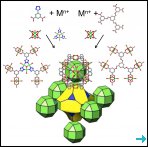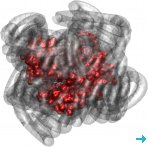Scientific Highlights
News and Highlights from research made possible by NMI3´s Access Programme
If you would like to send us news to publish here please contact our information manager Inês Crespo.
Don´t forget to register to receive regular NMI3 news directly in your mailbox.
The rht net: an ideal blueprint for the construction of a metal–organic framework platform
The need for tunable functional solid-state materials is increasing because of the growing demand to address persisting challenges in global energy issues, environmental sustainability, and others. It is practical and preferable for such materials to be pre-designed and constructed to exhibit the desired properties and specific functionalities for a given targeted application. Read more
Proteins perform without water
The thin film of water around proteins, their hydration water, is vital to the macromolecule’s biological activity. It was believed that without hydration water, proteins would not only be incorrectly folded but also lack the conformational flexibility that animates their 3D structures and brings them to life. However, a team of scientists found out otherwise. Read more
Towards a new tumour-specific contrast agent for MRI applications
By Luigi Paduano
Nowadays, it is estimated that cancer is responsible for about 25% of all deaths in industrialised countries, 8 million people worldwide. Scientific research is currently studying novel strategies (including drugs, therapies and devices) able to be successfully used in medicine, when early diagnosis and/or techniques like radiation therapy, immunotherapy, chemotherapy, etc. have proved to be ineffective. Read more



